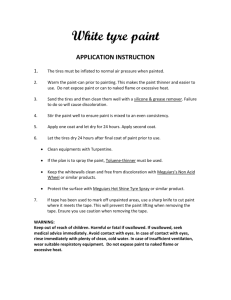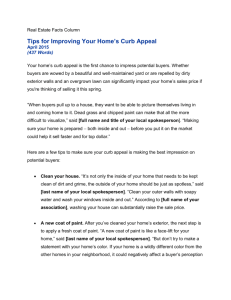BIN Primer Sealer and Stain Killer
advertisement
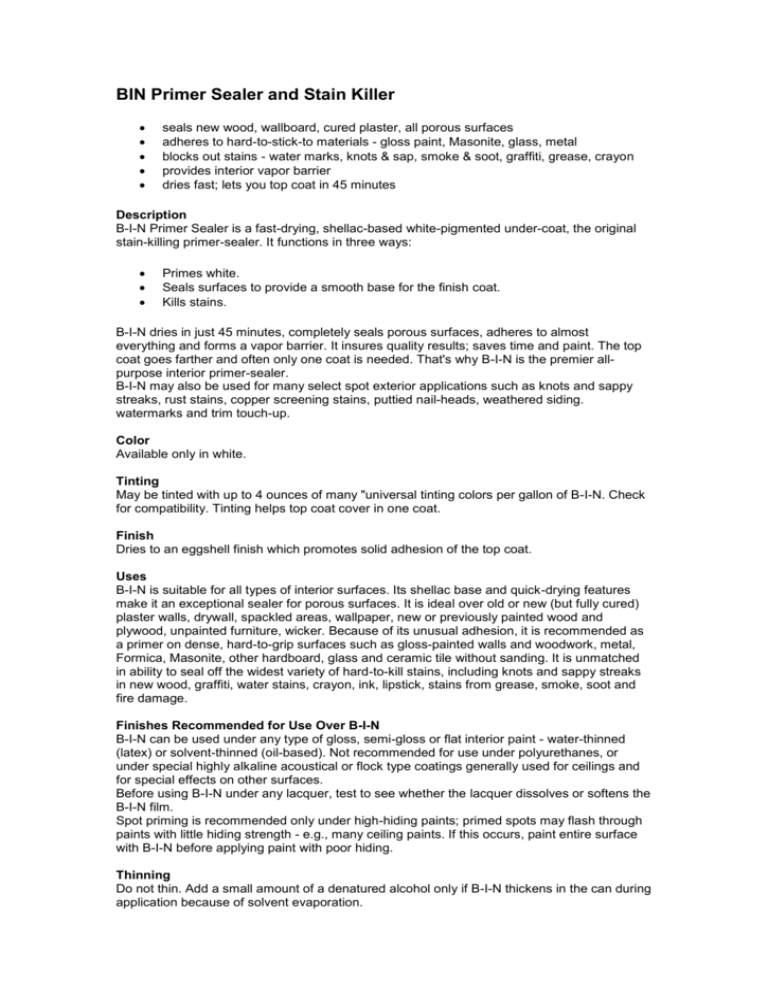
BIN Primer Sealer and Stain Killer seals new wood, wallboard, cured plaster, all porous surfaces adheres to hard-to-stick-to materials - gloss paint, Masonite, glass, metal blocks out stains - water marks, knots & sap, smoke & soot, graffiti, grease, crayon provides interior vapor barrier dries fast; lets you top coat in 45 minutes Description B-I-N Primer Sealer is a fast-drying, shellac-based white-pigmented under-coat, the original stain-killing primer-sealer. It functions in three ways: Primes white. Seals surfaces to provide a smooth base for the finish coat. Kills stains. B-I-N dries in just 45 minutes, completely seals porous surfaces, adheres to almost everything and forms a vapor barrier. It insures quality results; saves time and paint. The top coat goes farther and often only one coat is needed. That's why B-I-N is the premier allpurpose interior primer-sealer. B-I-N may also be used for many select spot exterior applications such as knots and sappy streaks, rust stains, copper screening stains, puttied nail-heads, weathered siding. watermarks and trim touch-up. Color Available only in white. Tinting May be tinted with up to 4 ounces of many "universal tinting colors per gallon of B-I-N. Check for compatibility. Tinting helps top coat cover in one coat. Finish Dries to an eggshell finish which promotes solid adhesion of the top coat. Uses B-I-N is suitable for all types of interior surfaces. Its shellac base and quick-drying features make it an exceptional sealer for porous surfaces. It is ideal over old or new (but fully cured) plaster walls, drywall, spackled areas, wallpaper, new or previously painted wood and plywood, unpainted furniture, wicker. Because of its unusual adhesion, it is recommended as a primer on dense, hard-to-grip surfaces such as gloss-painted walls and woodwork, metal, Formica, Masonite, other hardboard, glass and ceramic tile without sanding. It is unmatched in ability to seal off the widest variety of hard-to-kill stains, including knots and sappy streaks in new wood, graffiti, water stains, crayon, ink, lipstick, stains from grease, smoke, soot and fire damage. Finishes Recommended for Use Over B-I-N B-I-N can be used under any type of gloss, semi-gloss or flat interior paint - water-thinned (latex) or solvent-thinned (oil-based). Not recommended for use under polyurethanes, or under special highly alkaline acoustical or flock type coatings generally used for ceilings and for special effects on other surfaces. Before using B-I-N under any lacquer, test to see whether the lacquer dissolves or softens the B-I-N film. Spot priming is recommended only under high-hiding paints; primed spots may flash through paints with little hiding strength - e.g., many ceiling paints. If this occurs, paint entire surface with B-I-N before applying paint with poor hiding. Thinning Do not thin. Add a small amount of a denatured alcohol only if B-I-N thickens in the can during application because of solvent evaporation. Surface Preparation Surface must be clean and dry. Test all old painted or varnished surfaces for adhesion by making an X with a razor or knife and placing a section of Scotch® tape over it, pressing it down firmly. After 30 seconds yank the tape off (do not pull, but yank at the tape). If the old paint or vanish comes off on the tape, the paint should be removed. Remove any wax with mineral spirits or commercial wax remover. Allow to dry thoroughly. Scrape off loose or scaling paint and wallpaper paste. Fill wall cracks and nail holes with patching paste; sand smooth when dry. Sand unfinished wood with fine sandpaper. Remove dust with tack cloth. Remove rust on metal by sanding, then wipe down with mineral spirits or turpentine. Application Methods B-I-N may be brushed, rolled or sprayed, using material at container consistency. Brush Application: Flow on freely. B-I-N is self-leveling and dries free from brush ridges. Roller: Use a short nap roller. Sprayer: Use between 20 and 30 pound pressure for air; 0.015 tip for airless. Airless sprayers only: To slow drying and prevent clogging, up to 3 fl.oz., paint thinner or VMP naphtha per gallon B-I-N may be added. Stir in vigorously just before use to disperse thoroughly. Can be applied at temperatures as low as 0 degrees Fahrenheit. Drying Time Dry to handle: 15 to 20 minutes. Dry, ready for final finish: 45 minutes. At very low temperatures or high humidity, allow extra drying time. Coverage By Brush On non-porous surfaces: up to 500 sq. ft. per gallon (12 sq. meters per litre). On porous sufaces, such as wallboard: up to 450 sq. ft. per gallon (11 sq. meters per litre). Cleaning Equipment Clean brush or roller while still wet. Most effective and simple to use is a solution of household ammonia (1 part) and warm water (3 parts). Soak brush or roller thoroughly, well into the bristle or nap; then wash with soap and water and rinse. Or clean with denatured alcohol. Sprayer may be cleaned with ammonia or alcohol. If ammonia is used, rinse with water, then with alcohol to dry parts. Specific Interior Uses New Plaster. B-I-N effectively seals off porous plaster walls. permitting, in many cases, the use of only one finish coat. Tinting to approximate shade of finish coat is recommended. Apply over new plaster only after it is thoroughly cured and dry. Industry practice is to wait at least 90 days before painting. Even then, it is wise to have the plasterer confirm that the surface is ready for paint. Drywall. B-I-N seals off gypsum wallboard (sheetrock) effectively, insures uniform holdout of the finish coat of paint on the paper facing as well as on taped joint areas. And it does not raise facing paper fibers. New Wood and Plywood. On these surfaces. B-I-N performs three functions: (1) Seals the wood for uniform holdout of finish coat of paint. (2) Kills stains from knots or sappy streaks. (3) Seals off spackled or puttied nailheads. Hard Wallboard. Because of its shellac base, B-I-N bonds firmly to Masonite® and similar dense materials, providing a perfect prime coat for a finish coat. Be sure surface is free of wax and surface agents before pnming. Metal. Glass, Formica, Ceramic and Plastic Tile. Metal pipes. ductwork and omamental pieces: glass window and mirrors: and ceramic tile, tile board, plastic sheet and tile baked on metal all present hard, non-porous surfaces to which ordinary primers often won't adhere. But the remarkable adhesion of shellac-based B-I-N provides a 'bonding' undercoat that's an excellent base for the finish coat. Sanding or other treatment is not needed for a good bond. Glossy and Stained Woodwork. B-I-N can be applied to previously painted gloss woodwork with no surface preparation (except wax removal), ensuring a good bond between the original painted surface and the new finish. No sanding or use of etching or deglossing compounds is needed. Where woodwork has been stained or varnished: B-I-N permanently seals in the stain and prevents any bleed-through to the finish coat. If excessive "pinking" or bleeding occurs (ordinarily over aniline stains) allow at least two hours drying time before applying finish coat. The discoloration is locked into the film and will not show up in the top coat. Graffiti. One coat of B-I-N seals off graffiti from crayon, lipstick, ball point and marking pens and spray paint cans. Strong Colors. B-I-N blocks out most existing colors in one coat where many coats of most finish paints may not. Fire Damage Repair. B-I-N is the ideal primer for fire damaged surfaces. Smoke, soot and water marks are eradicted and the lingering smell of fire is eliminated. Charred wood should be replaced. All surfaces should be cleaned with a cleanerdesigned for fire damage and let dry completely before priming. Grease and Smoke Stains. B-I-N provides a barriercoat for these stains, preventing them from discoloring or bleeding into the finish coat of paint. First dampen a clean cloth with turpentine or mineral spirits and wipe areas to remove excessive grease or oil, follow with ammonia and water, rinse well, allow to dry: then apply B-I-N. Under Porous Wallcoverings. B-I-N is an excellent primer for use under most porous wallcoverings such as uncoated wallpaper, string or grasscloth and fabrics, and may be used over most surfaces. B-I-N assures adhesion to gloss surfaces without sanding and will prevent ink bleed-through when old wallcoverings are overhung. Apply a coat of Wonder Base over the B-I-N as a sizing before hanging. Under Non-porous Wallcoverings. B-I-N may be used as a sealer under vinyls, foils or coated wallpapers to insure even adhesion when hanging over unpainted cured plaster or drywall, flat painted walls and other porous surfaces. Apply a coat of Wonder Base overthe BI-N as a size before hanging. B-I-N is not recommended when hanging non-porous wallcoveringsover gloss or semi-gloss paint or existing vinyl or foil wallcoverings. Use Shieldz Pre-Wallcovering Primer. Vapour Barrier. B-I-N has a "perm" rating of 0.4 perms. which means it is an exceptional vapor barrier. ("Perm" is a unit measuring the permeability of a film to moisture.) Sealing walls and ceiling with B-I-N keeps moisture vapour in the house, making it more comfortable in winter. It also keeps moisture from condensing on insulation in attics and between walls and from passing through walls to cause blistering and peeling of exterior paint. Refrigerated or Cold Rooms. The absense of residual odor from the alcohol solvent in B-I-N makes it ideal for use in refinishing refrigerated rooms, cold lockers. etc. The U.S. Department of Agriculture accepts B-I-N as a coating for application to structural surfaces or surfaces where there is a possibility of incidental food contact in official establishments operating under the Federal meat and poultry inspection program. Be sure the walls of the room are dry before the B-I-N is applied. Unfinished Furniture. Remove any protective wax coating with a good commercial wax remover. Sand surface with fine sandpaper to remove any roughness. fingerprints.etc. Remove dust with tack cloth. Apply one coat of B-I-N. Allow to dry 45 minutes. Sand lightly and remove dust. Apply finish coat. Antiquing Furniture. B-I-N is recommended for this application too because of its remarkable adhesion and stain-killing properties. Remove any wax with a good commercial wax remover, following the manufacturer's directions. Sand smooth any imperfections in the previous finish. Apply one coat of B-I-N. Allow to dry 45 minutes. Then follow manufacturer's instructions for the antiquing kit or glazing compound being used. Children's Toys. Because of B-I-N's pure shellac base and the absence of toxic pigments. it conforms to American Standard Z266.1-1964 and can be used for refinishing children's toys, carts. bicycles.etc. The finish coat should be a non-toxic paint recommended for this end use. Specific Exterior Uses B-I-N is formulated for interior applications, and it does not possessthe same weathering properties as a conventional exterior primer. On the other hand, few exterior primers possess the sealing, stain-killing and quick-drying properties of B-I-N. Over the years, therefore, painting contractors - who have long used shellac for exterior knot sealing - have turned to shellac-based B-I-N for such exterior applications as: New Wood. Many poor grades of lumber, with knots and sappy streaks, are being used on the exterior and interior of homes today. One or two coats of B-I-N have been found to be effective for spot sealing or killing stains over these problem areas prior to the application of the conventional paint. However, sap stains and knots in some new green pine may require a coat of 4 lb. Bulls Eye Amber Shellac prior to application of B-I-N. After spot-priming, prime the entire surface with Bulls Eye 1-2-3. Then apply two coats of a high-quality latex house paint for maximum weathering. Spot Priming. On so-called "one-coat" exterior paint jobs. B-I-N can be used to spot prime weathered areas such as trim, window sills, etc. Rust Stains and Streaks. Where nails, ironwork, gutters and down-spouts have stained previously painted surfaces, B-I-N may be used to spot-prime these areas to seal off the stains. Aluminum Gutters, Downspouts, Fan Vents. B-I-N. because of its remarkable adhesion to aluminum, is the ideal primer for these exterior surfaces. It is less effective on exterior galvanized metal surfaces.
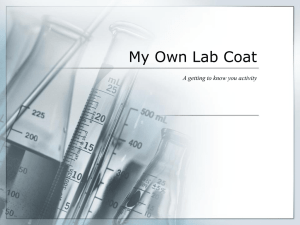
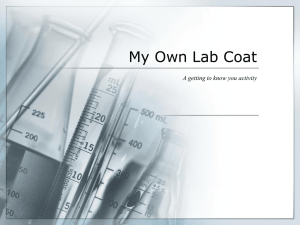
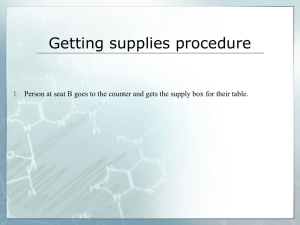
![[Agency] recognizes the hazards of lead](http://s3.studylib.net/store/data/007301017_1-adfa0391c2b089b3fd379ee34c4ce940-300x300.png)
